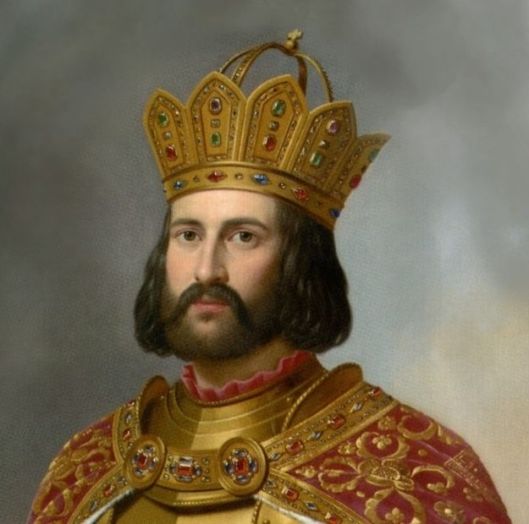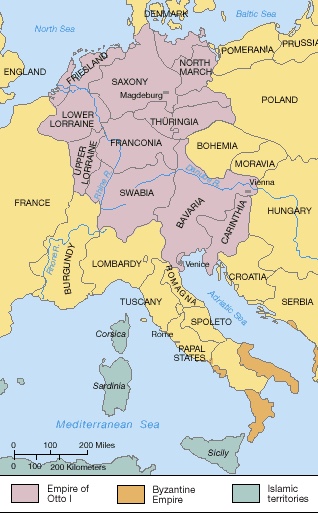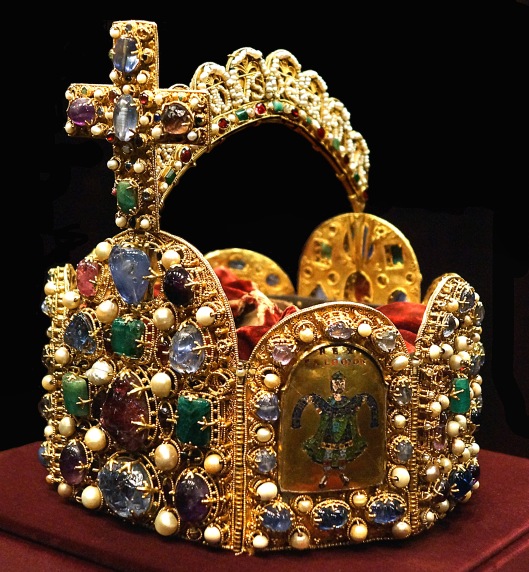Tags
Charlemagne, Charles V Holy Roman Empire, Essay on the Manner and Spirit of Nations and on the Principal Occurrences in History, Frederick Barbarossa, House of Hohenstaufen, Karl V, Otto the Great, Voltaire
Otto I, the Great. Holy Roman Emperor, Duke of Saxony.

After developing my love of royalty with my interest in the British monarchy my next fascination was with the German monarchies. The history of monarchy in Germany can make your head spin. We have the Carolingian Empire founded by Charlemagne, the Kingdom of Germany and then the Holy Roman Empire of the German Nation. Historians are all over the map with these terms, some seeing all of these as one entity while others see them as three distinct entities. I think the truth is that what became the Holy Roman Empire was something that had evolved over time and has been connected to previous empires.
On Christmas day 800, Charles the Great (Charlemagne) was crowned Emperor by Pope Leo III. His actual title was Imperator Romanorum, Emperor of the Romans. I recall one historian which I watched on TV discussing a biography of Charlemagne mention that his empire really did not have a name. He was supposed to have revived the Roman Empire in the West. The Eastern Roman Empire, or the Byzantine Empire as it was called, was still thriving in the year 800CE with Irene of Athens as the reigning Empress. However, today Charlemagne’s Empire is not seen as a continuation of the Roman Empire but the originator of a new Empire which eventually was called the Holy Roman Empire of the German Nation. This points to an interesting aspect of historiography; terms and labels that we are now familiar with were often inventions by later historians and placed retrospectively on the past. My mentioning of the Byzantine Empire is a good example. To its contemporaries the Byzantine Empire was known simply as the Roman Empire.

Charlemagne’s empire was eventually dived up with the western half evolving into the Kingdom of France. The last Imperator Romanorum of Charlemagne’s empire, according to some historians, was Berengar of Friuli (c845-924) who ruled from 915 until his death in 924. Some historians count Arnulf of Carinthia (850-899) as the last official holder of the imperial title from 896 until his death in 899. The next definitive holder of the Imperial title would be Otto of Saxony (912-973) who was crowned Emperor on February 2, 962, by Pope John XII. Otto’s father, Heinrich the Fowler is numbered as Heinrich I among the Holy Roman Emperors despite never holding the imperial title. Heinrich the Fowler held the title Rex Teutonicorum “King of the Germans.” Reading on the history of the German Kingdom it looks as if several monarchs reigned at the same time. For example, Heinrich I’s immediate predecessor, Conrad I (890-918) who ruled as a German King from 911 until his death in 918 is also listed as a Holy Roman Emperor although he never held the imperial title.
With such confusion among historians over this time period (it still makes my head spin) it is easy to see how Otto can be called the first of the Holy Roman Emperors since it was the revival of his title which evolved into the Holy Roman Empire. The German aspect of the nation wouldn’t be emphasized until the end of the Hohenstaufen Dynasty under Conrad IV (1250-1254) when the Italian possessions of the empire were lost. It was also during the Hohenstaufen Dynasty when the term “Holy” was attached to the empire to signify its close association with the Church. Emperors were not considered to have adopted their office until officially crowned by the pope. As future emperors wanted to assert their own authority the papal coronation was done away with. Holy Roman Emperor Maximilian I adopted the title Erwählter Römischer Kaiser (Elected Roman Emperor) with approval of Pope Julius II, ending the custom that the Holy Roman Emperor had to be crowned by the pope.
The Holy Roman Empire continues to fascinate me and even the times which came after it . After looking at the complexities of its history I can agree with Voltaire’s famous description of the empire in his 1756 Essay on the Manner and Spirit of Nations and on the Principal Occurrences in History, that the Empire as “neither Holy, nor Roman, nor an Empire.”
Crown of the Holy Roman Emperors






